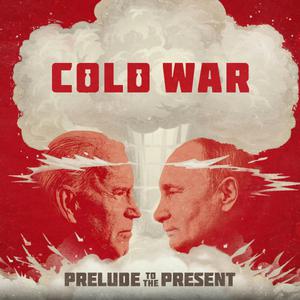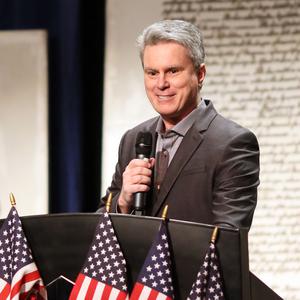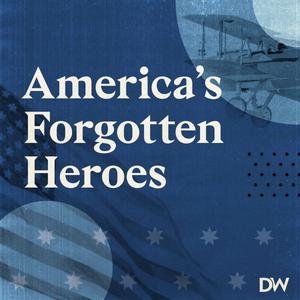
The Cold War: Prelude To The Present
The Daily Wire
The Cold War may be over, but the tension between Russia and the West remains. Join Bill Whittle as he narrates this compelling series about two competing ideologies battling for global supremacy in the ashes of World War II.
- 3 minutes 59 secondsA New Podcast from Bill Whittle: America's Forgotten Heroes
Get ready to unpack the exciting untold history of heroes who saved America in some of its darkest hours. Subscribe NOW to America’s Forgotten Heroes on Apple Podcast, Spotify, and everywhere you listen to podcasts so you don’t miss an episode!
America's Forgotten Heroes on Apple: https://utm.io/uduT7
America's Forgotten Heroes on Spotify: https://utm.io/uduT8
Learn more about your ad choices. Visit podcastchoices.com/adchoices
9 July 2021, 10:21 pm - 1 hour 28 minutesA Pizza Hut Parade | Part 13
Nixon goes to China and in a masterstroke of diplomacy turns a two-power Cold War into three-power triangular diplomacy, giving the United States the leverage for Détente, a chance for a soft landing for the Cold War in the 1970s. But Watergate destroys not only the Nixon administration; it reduces American morale and determination to its lowest point during the entire conflict. The Soviet perception of American weakness leads to their invasion of Afghanistan, and the likelihood of nuclear Armageddon unleashed in a picturesque German town named Fulda.
And then, seemingly overnight, the situation reverses itself: engaged in their own quagmire in Afghanistan, mired in the Brezhnev Stagnation, and plagued by an embarrassing series of fossilized leaders, the Soviets fall ever farther behind. And across the Atlantic, America's oldest President brings youthful vigor, renewed optimism and unprecedented resolve to a dying national identity, and decides on a plan to resolve the forty-year running stalemate and end the Cold War with a win.
Learn more about your ad choices. Visit podcastchoices.com/adchoices
24 April 2020, 10:00 am - 1 hour 2 minutesThe Liberators | Part 12
A change of commanders comes too late to reverse the situation in Southeast Asia as Richard Nixon's program of 'Vietnamization' eases America out of its worst-directed war. But long before the last American serviceman leaves Vietnam, a new generation of liberators rise to the challenge of saving American tactics, weaponry and doctrine from themselves.
Thirty thousand feet above the Green Spot at Nellis Air Force Base, a loud, uncouth, unpleasant warrior / poet emerges. Starting with his almost supernatural feel for what a fighter jet can and cannot do, he will spend a decade teaching himself the engineering skill and mathematical language necessary for him to quantify what works in the lethal world of aerial combat, and what does not. Fighting an uphill battle against arrogance, ignorance and intransigence, his legendarily irrefutable Pentagon briefings will forever change the way America builds the fighter aircraft that will guarantee the Air Superiority needed to prevail on the Cold War battlefield of central Germany. And a fellow liberator, just a kid who grew up hunting in his native Arkansas, will just as effectively revolutionize American ground tactics through sheer courage, concentration and willpower, and usher in the age of Special Forces.
Learn more about your ad choices. Visit podcastchoices.com/adchoices
17 April 2020, 10:00 am - 1 hour 3 minutesFrom The Jaws Of Defeat | Part 11
Mired not only in the jungles of Southeast Asia but, worse, mired in outdated, rigid doctrine, fossilized tactics, and declining morale, a light can be made out in the middle of America's darkest night. A swaggering fighter jock, married to a movie star, turns a demoralized, undertrained and under-led group of dispirited American flyers into a snarling Wolfpack that pulls off a supersonic ambush in one of the greatest military operations of all time.
Meanwhile, on the other side of the world, the continued loosening of the leash of fear in the Soviet Union can be felt by what its citizens have to joke about. But in Prague, the hopeful spring of liberal reforms gets crushed by a Russian bear that remains in full possession of a nasty set of teeth and claws.
Learn more about your ad choices. Visit podcastchoices.com/adchoices
10 April 2020, 10:00 am - 1 hour 9 minutesWelcome To The Suck | Part 10
You stepped out of a big, air-conditioned silver bird, out into the kind of heat, sunlight and humidity that even Americans raised in the Deep South could not believe. You would wander around, wondering where your ground transport was, and what your barracks might be like, and once the immensity of the new reality fully hit, someone with more time in-country might notice your expression and mutter, "Hey man. Welcome to the suck."
When USS Maddox came under attack from North Vietnamese torpedo boats while in international waters in 1964, President Lyndon Johnson uses the incident to open the throttle on the war to contain communism in Vietnam. Advising him is a Madison Avenue Wonder Boy, using computer formulas to triangulate on an elusive victory. And a dangerous, potentially fatal fossilization of politics and military doctrine slowly but inexorably plunges the United States into its darkest years of the Cold War.
Watch "Apollo 11: What We Saw" on YouTube: https://www.youtube.com/watch?v=k9BmufbVf2E
Listen to "Apollo 11: What We Saw" on iTunes: https://podcasts.apple.com/us/podcast/we-choose-to-go-to-the-moon-part-1/id1471188269?i=1000444360842
Listen to "Apollo 11: What We Saw" on Spotify: https://open.spotify.com/episode/5nZzb7bUOltWKss5hY4K8U
Learn more about your ad choices. Visit podcastchoices.com/adchoices
3 April 2020, 10:00 am - 1 hour 29 minutesCloaks and Daggers | Part 9
With the mechanisms of apocalypse firmly in place, both sides accelerate their efforts to determine the actual capabilities of the other. No detail is too insignificant: attempts are made to recover Soviet test warheads from the bottom of the ocean.
By the time USS Triton circumnavigates the globe underwater, the full potential of the nuclear submarine as the preeminent weapon of the Cold War becomes apparent. And so the ever-increasing pressure to discover how many warheads the other side has, and how they work, and most importantly, where they are, the United States and the Soviet Union diverge in regard to intelligence gathering. The massive US lead in technology leads to spy satellites, hypersonic reconnaissance planes and the most ambitious intelligence operation in human history. The Soviets, on the other hand, play to their strengths as well: the ability to turn individual human assets. One of these paths will lead to the biggest intel haul of the Cold War.
Learn more about your ad choices. Visit podcastchoices.com/adchoices
27 March 2020, 10:00 am - 49 minutes 32 secondsTo The Precipice | Part 8
Following the Bay of Pigs disaster, and a second crisis in Europe resulting in the deadly grey reality of the Berlin Wall, an over-confident Nikita Khrushchev decides to further test what the Soviets see as a weak and vacillating Kennedy administration. As US reconnaissance overflights of Cuba resume after a hiatus following the events at Playa Giron, analysts are shocked to discover rings of Russian-made surface-to-air missile installations. While these themselves pose no threat to the United States, the installations follow the classic designs used by the Soviets to protect important ground installations.
Then they see them: Russian medium-range, nuclear-tipped missiles capable of striking the entire East Coast. More are on the way from Russia, lashed to the decks of Soviet transports. Announcing an outright blockade of Cuba would be recognized as an act of war, so President Kennedy employs the Soviet tactic of linguistic sophistry and announces a "quarantine zone." As US Navy warships move to intercept the incoming missiles, the fate of the world hangs in the balance -- and is ultimately in the hands of a single man, not in either the White House or the Kremlin, but deep beneath the waves at the edge of the quarantine zone.
Learn more about your ad choices. Visit podcastchoices.com/adchoices
20 March 2020, 10:00 am - 43 minutes 38 secondsPlaya Giron | Part 7
He had grown up a rich kid, believe it or not: the illegitimate son of a millionaire planter and a servant girl half his age. He was named "Truth," he was handsome and rugged, a 6'3" charismatic giant who had arrived back on his native shore with Che Guevara and handful of men on a leaky tub named "Granma." He faced off against Presidents Eisenhower, Kennedy, Johnson, Nixon, Ford, Carter, Reagan, Bush, Clinton, Bush Jr, Obama and lived to see the election of Donald Trump.
His name was Fidel Castro, and he brought communism to the Western Hemisphere. He would turn his native Cuba into a launching pad for Soviet nuclear missiles, a mere 90 miles south of the Florida keys. He would impoverish his nation for six decades and die with $900,000,000 in his personal bank account. And his first and greatest test would be to repel an American-backed invasion at Playa Giron, a beach on the southern coast of Cuba at the mouth of an inlet called the Bay of Pigs.
Learn more about your ad choices. Visit podcastchoices.com/adchoices
13 March 2020, 10:00 am - 1 hour 16 minutesWe Like Ike | Part 6
In the years after World War II, Dwight David Eisenhower was arguably the most popular man on the planet. Ike’s prestige was so immense that in 1948, President Harry S Truman offered him the top slot on the 1948 Democratic ticket, with the offer to revert to his former position as Vice President under Eisenhower. It wasn’t enough.
But by 1952, a Draft Eisenhower committee threw an enormous rally: thousands of screaming fans, movie stars, and Irving Berlin himself leading the crowd in a rendition of God Bless America… all of this for a man who wasn’t even there. Finally persuaded, General Eisenhower became President Eisenhower, facing a brace of unknown Soviet leaders named Malenkov and Khrushchev. But no one — not even those who had so strongly lobbied for him — were prepared for the anti-military, anti-war statements and policies from the man who had been assumed to be the fiercest of Cold Warriors.
Learn more about your ad choices. Visit podcastchoices.com/adchoices
6 March 2020, 10:00 am - 43 minutes 8 secondsDeath In The Kremlin | Part 5
Joseph Stalin, the architect and instigator of the 42-year Cold War, has died five years into the conflict. Across the Atlantic, a new Republican President, who had worked closely with Uncle Joe during World War II, is a mere two months in office. As the knives come out for the succession fight inside the Kremlin, will a brief window of opportunity be enough to completely reset the conflict?
Learn more about your ad choices. Visit podcastchoices.com/adchoices
28 February 2020, 11:00 am - 1 hour 4 minutesThe Forgotten War | Part 4
Although the entire Cold War passed without shots being fired between the two superpowers, the Cold War was anything but bloodless. The Korean conflict marked the beginning of proxy wars, regional conflicts backed by the full military might of both the United States and the Soviet Union. A brilliant amphibious landing turns the tide on the Korean Peninsula; meanwhile, America raises the stakes with a bomb so powerful it takes an atomic bomb to simply light the fuse.
Learn more about your ad choices. Visit podcastchoices.com/adchoices
21 February 2020, 11:00 am - More Episodes? Get the App
Your feedback is valuable to us. Should you encounter any bugs, glitches, lack of functionality or other problems, please email us on [email protected] or join Moon.FM Telegram Group where you can talk directly to the dev team who are happy to answer any queries.
 The Andrew Klavan Show
The Andrew Klavan Show
 The Ben Shapiro Show
The Ben Shapiro Show
 Bill Whittle Network
Bill Whittle Network
 The Matt Walsh Show
The Matt Walsh Show
 America's Forgotten Heroes
America's Forgotten Heroes
 Morning Wire
Morning Wire